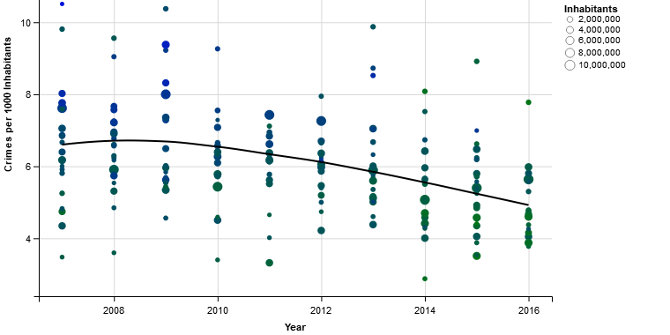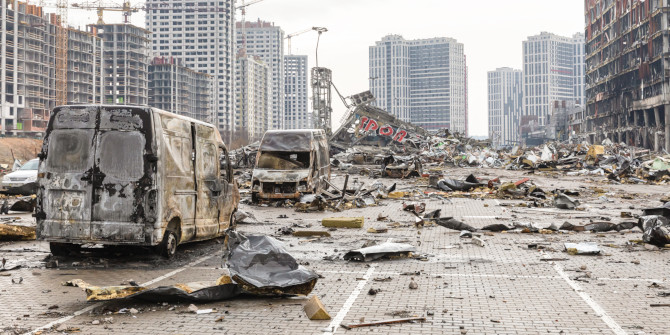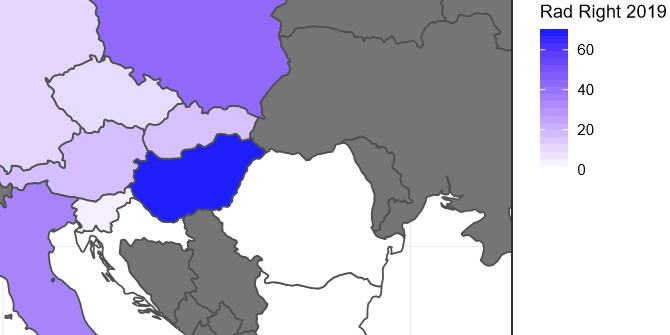In the aftermath of Russia’s full-scale invasion of Ukraine in 2022, the EU gave temporary protection rights to Ukrainians fleeing the conflict and suspended a visa facilitation agreement with Russia. Matilde Rosina writes the response to the conflict illustrates the importance of migration policies for the EU’s soft power.
More than six million Ukrainians have fled their country since Russia launched its full-scale invasion in February 2022, with 93% of those who have left now residing in Europe. In response to the conflict, the EU granted unprecedented rights to Ukrainian refugees, while restricting entry from Russia. But why did the EU adopt such a generous policy for Ukrainians, considering the longstanding concerns of the European public about migration?
I explore this question in a recent study, arguing that the EU used its migration policy for strategic purposes, as a means to increase its soft power. On the one hand, by welcoming Ukrainians, the EU sent a strong message to Ukraine, Russia and the international community that the EU stands in solidarity with Kyiv. On the other hand, by restricting entry for Russians, it underscored Moscow’s condemnation and isolation. Throughout, the EU presented itself as a leading actor in the international sphere and as the champion of freedom and democracy.
Soft power
Soft power is power that goes beyond security or economic means, drawing instead from a country’s values and culture to influence others. The UK monarchy, particularly under the reign of Queen Elizabeth II, is often cited as a source of soft power for the UK, contributing to the country’s cultural influence and global image. Estimates suggest that the monarchy contributes over £1.7 billion per year to the UK economy, including through its effects on tourism, trade, media and arts. Beyond the case of the UK, the core idea is that soft power is not based on coercion or strength, but on persuasion and influence.
Upon the outbreak of the Ukraine war, Europeans rapidly mobilised in support of fleeing Ukrainians. For the very first time, the EU adopted the “temporary protection” mechanism, granting special rights to Ukrainians by enabling them to work, reside and access education and medical assistance while in the EU. Considering the widespread hostility towards immigration, the EU’s response caught many commentators by surprise, leading them to question why temporary protection was adopted.
Many researchers have attributed the decision to either pragmatism or selectivity. Concerning pragmatism, authors have argued that the geographic proximity to Ukraine made the EU a “location of first response” for displaced Ukrainians. Indeed, it is reasonable that many Ukrainians would seek safety in the EU, considering Ukraine shares a border with four EU member states (Poland, Slovakia, Hungary and Romania) and that, globally, 70% of refugees are hosted in neighbouring countries. Concerns about the high number of Ukrainians who were about to enter the EU were indeed repeatedly stressed by EU institutions to justify the adoption of temporary protection.
As for selectivity, some researchers have argued that the generous response to Ukrainian refugees, while welcome, is the result of double standards. Why was temporary protection not activated for Syrians, Afghans or Iraqis? The argument here is that the measure was only activated now because Ukraine is seen as a European country, and Ukrainians as Europeans with “blue eyes and blond hair”. Research indeed suggests that the level of public support for Ukrainian refugees is higher compared to that for Afghan or Somali refugees.
Strategic factors
Besides pragmatism and selectivity, I argue that strategic factors underlie the adoption of temporary protection. Refugee policies such as temporary protection carry a high degree of symbolism and relevance for a country’s geopolitics. When countries grant asylum, they do so on the basis that a refugee is facing persecution and is unable or unwilling to be protected by its country of origin. By doing so, they imply a judgement on other countries’ safety, human rights protection and freedom from persecution.
In the context of the war in Ukraine, temporary protection was employed for strategic purposes, recalling the United States’ open-door policy towards individuals fleeing the Soviet Union during the Cold War. This was achieved through multiple mechanisms.
First, by welcoming Ukrainians, the EU sent a clear message to Moscow, Kyiv and the international community that the EU stands united with Ukraine. Official documents include numerous references to the EU’s solidarity with Ukraine, characterising the conflict not just as an attack on Kyiv but as an affront to European and global security too.
In a joint declaration, EU leaders similarly praised Ukrainians for protecting “their country and our shared values”, emphasising their firm commitment. Moreover, Ukraine was granted the status of “candidate country” for EU membership in less than four months since its application – in stark contrast to the average 3.5 years it took other states to obtain the same status.
Second, the EU leveraged temporary protection to portray itself as a responsible and united actor and, ultimately, to enhance its soft power. This is exemplified by Home Affairs Commissioner Ylva Johansson stating that, since the war started, the EU has been “stronger, more united and indeed more humane, than maybe ever before”.
Frequently, the EU’s unity and responsibility are presented in opposition to Russia’s isolation and infringements of international law. So, if Russia’s war is deemed “barbaric”, “unprovoked and unjustified”, the EU’s response is portrayed as “calibrated”, “intelligent and strategic”, setting up a clear contrast between the EU and Russia. In the words of European Commission President Ursula von der Leyen, “This is a clash between the rule of law and the rule of the gun; between democracies and autocracies; between a rules-based order and a world of naked aggression”.
Finally, in this “clash of two worlds”, the EU asserts its leading role in the international arena, portraying itself as the champion of freedom and democracy. As stressed by European Council President Charles Michel, “Europe can, if we so desire, have a real capacity for influence and power in the service of peace and of our values”.
Visa restrictions and Russia’s condemnation
If the EU adopted temporary protection to signal support for Ukraine, it equally relied on another migration policy to highlight condemnation of Russia: visa restriction. The sanctions adopted by the EU against Russia in the immediate aftermath of the invasion included suspension of a visa facilitation agreement. This means that it is now more difficult and costly for Russian people to obtain a visa to travel to the EU. Like refugee policies, visa policies are highly symbolic, signalling alignment with, or disapproval of, other countries and their leadership, as recently exemplified by Israel’s freezing of visas for humanitarian staff working in Palestine.
In the case of Russia, visa restrictions were used to express the country’s condemnation and its isolation from the international community. This sentiment is captured in a statement by Czech Minister of the Interior Vít Rakušan, stating that: “A visa facilitation agreement allows privileged access to the EU for citizens of trusted partners with whom we share common values. With its unprovoked and unjustified war… Russia has broken this trust”. Two distinct realities clearly emerge: the group of “trusted partners”, to whom special treatment is reserved; and Russia, which, due to its unwarranted invasion, is no longer part of such an inner circle.
A quiet superpower
Strategic objectives underlie the EU’s response to the war in Ukraine in the field of migration. On one front, the EU employed its migration policies to send a clear message to Ukraine, Russia and the international community, that the EU stands in solidarity with Kyiv.
Simultaneously, it leveraged these measures to erode Russia’s legitimacy and emphasise the country’s increasing isolation. Throughout, the EU harnessed migration policies as a means to enhance its soft power, by strengthening its global image as a responsible and influential actor, as the defender of freedom and democracy and, ultimately, as a “quiet superpower”.
For more information, see the author’s accompanying paper at Policy Studies
Note: This article gives the views of the author, not the position of EUROPP – European Politics and Policy or the London School of Economics. Featured image credit: Halfpoint / Shutterstock.com





